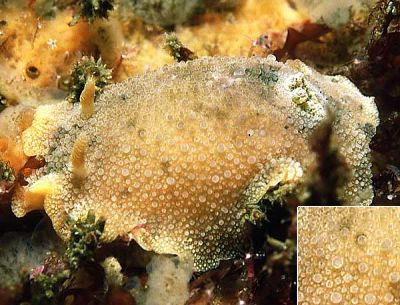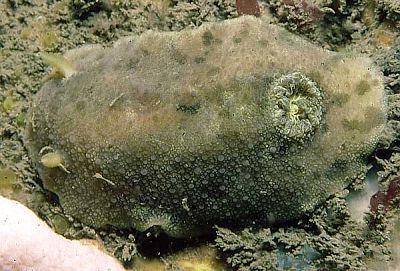Identifying Archidoris pseudoargus
June 13, 2001
From: Bernard Picton


Hi Bill,
I've looked again at the messages on your Archidoris pseudoargus and Geitodoris planata Pages. Peter van Bragt's animal animal and Michel Barrabe's are certainly both Geitodoris planata. Angel Valdes picture is the only one which really is Archidoris pseudoargus. As Jussi says in his message, the best feature for Geitodoris are the acid glands - larger tubercles with a stellate pattern around them, which are usually paler. The gills are much bushier and retract into a different shaped pocket. With specimens rather than photographs it is easier as there is a difference in shape and texture, Geitodoris is crisper/harder and flatter.
I've attached some Archidoris pictures here, and some of Geitodoris in a following message. Probably more than you need, but I like the way the forum allows illustration of a range of colour variation.
On the west coast of Ireland I've often observed smaller animals with small spawn coils and I wonder if this species can reproduce for a long time at different body sizes, or even live for two years, reproducing twice (if reproduction is seasonal). See separate message for photos of mating and egg ribbons of typical animals and the smaller ones mentioned above.
UPPER PHOTO: NE Soay, St. Kilda, Scotland - 22 Aug 1985 - 6cm
LOWER PHOTO: Ruecallan, Rathlin Is., N. Ireland - Jun 1988.
Bernard
bernard.picton.um@nics.gov.uk
Picton, B., 2001 (Jun 13) Identifying Archidoris pseudoargus. [Message in] Sea Slug Forum. Australian Museum, Sydney. Available from http://www.seaslugforum.net/find/4549Dear Bernard,
Thanks for this explanation. I have replaced Peter's photo at the top of the page. Most people think that large, relatively common dorids, must be easy to identify. I think I have more problems with large 'flat dorids' than any other group of nudibranchs. Usually a single photo is not sufficient, often we need to see a closeup to show the texture of the skin on the back, and photos of the underside to show the head, and to show the colour of the foot and the ventral surface of the mantle.
best wishes,
Bill Rudman
Related messages
-
Archidoris pseudoargus - mass mortality in south Wales
From: Judith Oakley, August 13, 2008 -
Re: Unknown Dorid from Italy
From: Sylvie Grall, July 2, 2007 -
Archidoris tuberculata? from Italy
From: Tancredi D'Onofrio, April 21, 2006 -
Two nudibranchs from Reykjavik, Iceland
From: Freyja Imsland, September 30, 2005 -
Reproduction in Archidoris pseudoargus
From: Bernard Picton , June 13, 2001 -
Re: Dorid from France
From: Angel Valdes, August 11, 2000 -
Re: Dorid from France
From: Peter H. van Bragt, August 10, 2000
